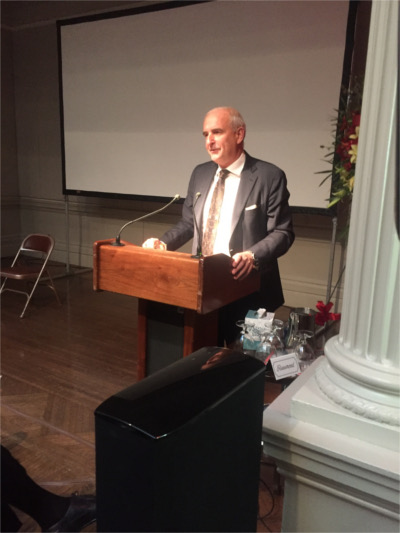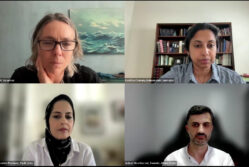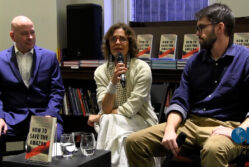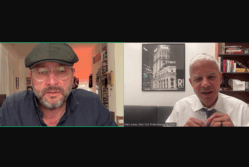Event Coverage Highlight

Roger Cohen Remembers Roy Rowan
 By Roger Cohen
By Roger Cohen
I met Roy a few months after I joined The Times in January 1990. A book of his called Connections: American Business and the Mob, written with Sandy Smith, had been killed in suspicious circumstances by his publisher. He thought there might be a story in what had happened. There was a story. More important there was the dawning of a friendship that spanned a quarter-century.
Roy became a friend, a role model and an inspiration to me. He was fearless. He was indomitable. He had gusto, a lust for life. He could not stand injustice or inhumanity. His blue eyes glittered with good humor but in them there was also a glint of steel. Nothing – but nothing – was going to get between him and reporting a story from the ground up, with integrity and determination and a relentless pursuit of the truth.
More than once, these past few weeks, I have thought of friends – Roy and Fritz Stern among them – and felt I was glad they were spared these times. In a way I still feel that. To live a long life through the 20th century and have it end in seeming amnesia about the lessons of that century’s carnage is not a fate to be wished on anyone. But I also know that Roy, like Fritz, would have relished the fight for the liberties that we all hold sacred. Phrases like “alternative facts”, “post-truth” and even the tautological “fact-based journalism” would have sparked their ire and made their antennae for every hint of authoritarianism quiver. They would have risen, unbending, to the challenge. As FDR put it: “Freedom of conscience, of education, of speech, of assembly are among the very fundamentals of democracy – and all of them would be nullified should freedom of the press ever be successfully challenged.”
As Roy knew, in the end it’s very simple: Without truth freedom perishes. Fascism breeds on the destruction of the distinction between truth and lies.
Roy went everywhere in pursuit of the truth. To me he represented everything a journalist and foreign correspondent should aspire to be. The word dispatch has become old-fashioned. But what Roy filed from China during the Civll War, from East Germany, from Hong Kong and from different datelines around the United States were dispatches – pieces of writing that brought places to life, explained them, showed the dilemmas of people living there, and transported readers into far-flung cities, villages, trenches and rice paddies. Technology has made us lazy. Journalists go out less often to find truth on the ground. Roy’s life is a reminder that for all the changes over the past decades there is still no substitute for being there, seeing, absorbing, understanding, and bearing witness. That’s why, when he was almost 70, he once spent two freezing weeks on the streets of New York City living as a homeless man for a 10-page story for People.
Roy knew how to put you right there at the scene. In this passage from Chasing the Dragon, listen to him in Shanghai in the 1940’s: “The clip-clop of bare feet on the pavement signaled a passing rickshaw. The rhythmic clack of chopsticks against a brass kettle revealed the presence of a noodle vendor summoning customers down the sidewalk for a late-night snack, while the insistent cry, “Membao! Membao!” announced the arrival of a competing vendor offering steamed bread instead.
“The pungent odor of their rival offering blended with the stench of the ‘honey buckets’ filled with human excrement, or ‘night soil’, as it was called, being carted out of town to the surrounding farms for fertilizer. But it wasn’t only the smell that informed everyone in the neighborhood of the honey bucket man’s coming. His creaky old wheelbarrow, with its iron-rimmed wheels, provided plenty of advance warning.”
Sounds, smells, habits and rituals: a great correspondent at work, discovering in details the deeper truth, making every word count.
I thought of Roy reading the last of Eliot’s four quartets the other day:
What we call the beginning is often the end
And to make an end is to make a beginning.
The end is where we start from. And every phrase
And sentence that is right (where every word is at home,
Taking its place to support the others,
The word neither diffident nor ostentatious,
An easy commerce of the old and the new,
The common word exact without vulgarity,
The formal word precise but not pedantic,
The complete consort dancing together)
Every phrase and every sentence is an end and a beginning,
Every poem an epitaph
No epitaph of Roy the journalist alone is adequate, for in him work and life were one. Roy introduced me to this club, told me I’d enjoy it in later years – and he was right, I already see myself dozing through afternoons in ample chairs after a good lunch. Roy was a master of gifts that keep on giving. And he of course was not one for dozing. He was, as you recall, the author of Never too Late: A 90-year-old’s Pursuit of a Whirlwind Life.
I have so many happy memories of meals here with him, of Block Island with the children, of Roy and Helen (and their always inspirational love for each other), of walking around New York with Roy, of parties and good times. Roy had a rare ability to take the best out of everything and everyone, without compromise and with generosity. He loved beauty. I see him casting a line into the morning surf at Block Island. I see the way he looked at Helen. Beauty and love are one. Roy knew that.
I recall him here at the Century saying to me once that he and Helen had started their marriage with gin martinis as their regular cocktail. But over time they found the drink tended to turn small misunderstandings into something more disputatious – so they found an elegant solution and switched to vodka martinis. That worked for a while. But over time, Roy explained, the same thing started to happen – so they switched to white wine and even eventually white wine spritzers.
A long marriage requires a measure of adaptability. Wisdom was something else Roy had in abundance.
He laughed and loved better than anyone I know. He enfolded friends and family in an enduring embrace that has enriched their lives beyond measure. I feel so lucky that an assignment all those years ago led me to him – and that I got to plunge deeply at that moment not only into a question of journalistic ethics that had affected him but also into discussions about the world that constituted the beginning of our rich friendship.
Our world today would have troubled him. But Roy knew that in the fellowship of the just, in the resolute defense of truth, in the joy of friendship, in laughter and conversation, in the embrace of the stranger, and in the strength of love a light shines that no thug can extinguish.
As Auden put it in his poem September 1, 1939, written here in NYC as Germany invaded Poland:
All I have is a voice
To undo the folded lie,
The romantic lie in the brain
Of the sensual man-in-the-street
And the lie of Authority
Whose buildings grope the sky:
There is no such thing as the State
And no one exists alone;
Hunger allows no choice
To the citizen or the police;
We must love one another or die.
Defenseless under the night
Our world in stupor lies;
Yet, dotted everywhere,
Ironic points of light
Flash out wherever the Just
Exchange their messages:
May I, composed like them
Of Eros and of dust,
Beleaguered by the same
Negation and despair,
Show an affirming flame.
Roy’s “affirming flame” is with us all now and will be forever.



